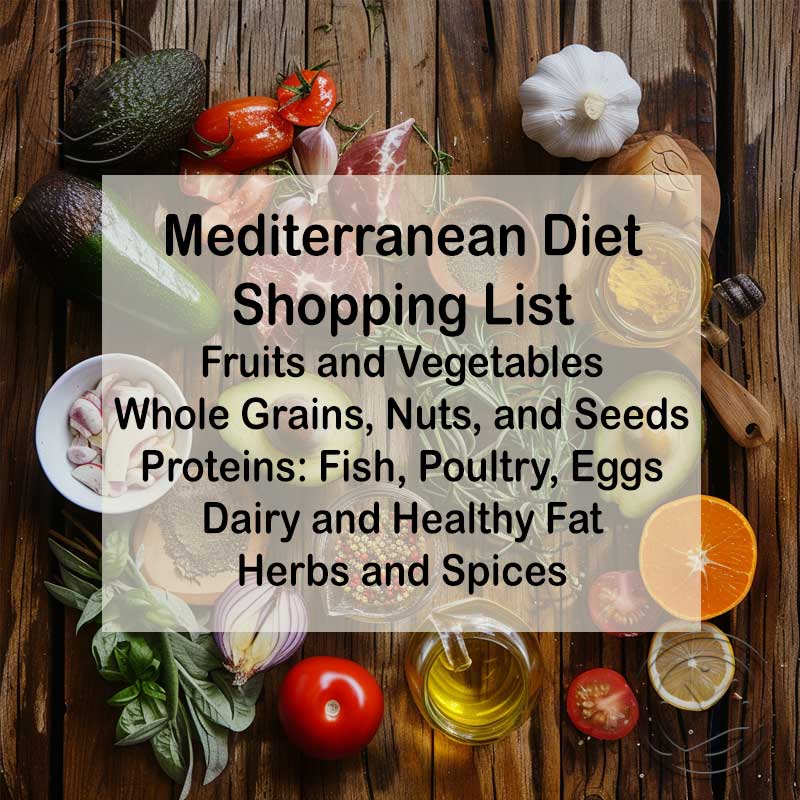Introduction
The Mediterranean diet is a culinary journey that takes its inspiration from the eating habits of countries bordering the Mediterranean Sea.
Renowned for its cardiovascular benefits, this diet emphasizes nutritionally rich foods and balanced eating patterns.
It’s not just about the ingredients; it’s about a lifestyle that encourages enjoying meals with family and friends, savoring every bite, and respecting the natural rhythms of life.
Central to this diet are whole foods: fresh fruits and vegetables, whole grains, legumes, nuts, and lean proteins, particularly fish.
Olive oil is a cornerstone, revered not just for its flavor, but also for its health benefits, including lowering bad cholesterol levels and reducing the risk of heart disease.
Mediterranean Diet Shopping List Essentials
To fully embrace the Mediterranean diet, your pantry and fridge should reflect the diet’s diversity and nutritional richness.
- Olive Oil: A staple of the Mediterranean diet, known for its heart-healthy fats.
- Whole Grains: These are vital for their fiber, vitamins, and minerals.
- Nuts and Seeds: Excellent sources of protein and healthy fats.
- Legumes: Rich in protein and fiber, they are a great meat alternative.
- Fresh Produce: The cornerstone of the diet, full of vitamins, minerals, and antioxidants.
- Lean Proteins: Including fish and poultry, these are essential for muscle health and overall wellbeing.
Are you ready to elevate your cycling game to the next level? The Paleo diet, based on ancient eating habits,…
Fruits and Vegetables
Fruits and vegetables are not just components of the Mediterranean diet; they are its stars.
The variety is staggering, and the health benefits are immense.
- Leafy Greens: Such as spinach and kale, rich in vitamins and minerals.
- Colorful Vegetables: Like bell peppers, eggplants, and tomatoes, full of antioxidants.
- Seasonal Fruits: Berries, citrus fruits, and apples, offering a range of flavors and nutrients.
A Mediterranean diet thrives on variety.
Each fruit and vegetable brings its unique set of nutrients and benefits, contributing to the overall nutritional balance of the diet.
Whole Grains, Nuts, and Seeds
Whole grains, nuts, and seeds are integral to the Mediterranean diet, providing essential nutrients and energy.
- Whole Grains: Brown rice, whole-wheat pasta, and barley are excellent carbohydrate sources, providing sustained energy and aiding in digestion.
- Nuts: Almonds, walnuts, and pistachios, rich in healthy fats and protein.
- Seeds: Such as flaxseeds and chia, packed with omega-3 fatty acids.
Incorporating a variety of these items not only adds different textures and flavors to meals but also ensures a broad intake of essential nutrients.
Mediterranean Diet and Bone Health
Unlock the secret to robust bones and a resilient skeletal system with the transformative power of the Mediterranean Diet. Dive…
Proteins: Fish, Poultry, Eggs
Protein in the Mediterranean diet comes primarily from lean sources like fish, poultry, and eggs.
- Fish: Especially oily varieties like salmon and mackerel, are high in omega-3 fatty acids, crucial for heart and brain health.
- Poultry: A lean source of protein, it’s best to choose free-range or organic options.
- Eggs: They are versatile and packed with high-quality protein and essential amino acids.
These protein sources are not just nutritious; they’re also integral in creating diverse and delicious Mediterranean dishes.
Dairy and Healthy Fat
Dairy products and healthy fats are consumed in moderation in the Mediterranean diet.
- Cheese and Yogurt: Preferably from goat or sheep milk, these are good calcium sources and add richness to meals.
- Healthy Fats: Primarily from olive oil, but also from nuts, seeds, and avocados. They’re key to absorbing fat-soluble vitamins and maintaining heart health.
Incorporating these elements adds depth to the diet, providing essential nutrients and enhancing the flavor of various dishes.
5 Must-Try Mediterranean Diet Coffee Recipes
Dive into the soul-stirring essence of Mediterranean coffee culture with "5 Must-Try Mediterranean Diet Coffee Recipes." Beyond a mere beverage,…
Herbs and Spices
Herbs and spices are not just flavor enhancers in the Mediterranean diet; they are nutritional powerhouses in their own right.
Incorporating a range of herbs and spices into your cooking can significantly elevate both the taste and health benefits of your meals.
- Basil and Oregano: Perfect for pasta sauces and pizzas.
- Rosemary and Thyme: Excellent for marinating meats and seasoning vegetables.
- Mint: Adds a fresh touch to salads and yogurt-based sauces.
Each herb and spice brings a unique set of health benefits, from anti-inflammatory properties to antioxidants that combat free radicals.
Mediterranean Diet on a Budget
Following the Mediterranean diet can be both economical and sustainable.
- Seasonal Produce: Buying fruits and vegetables in season is cost-effective and ensures optimal flavor and nutrition.
- Bulk Buying: Purchase grains, legumes, and nuts in bulk to save money in the long run.
- Home Cooking: Preparing meals at home is not only cheaper but also allows you to control the quality of ingredients used.
With careful planning and smart shopping strategies, the Mediterranean diet can be accessible to everyone, regardless of budget.
Planning Mediterranean Meals
Effective meal planning is key to maintaining the Mediterranean diet.
It ensures a diverse intake of nutrients and flavors throughout the week.
- Start with Vegetables: Build your meals around vegetables, adding in protein and whole grains.
- Protein Rotation: Include fish a couple of times a week, alternating with poultry and plant-based proteins.
- Whole Grains Base: Use whole grains like quinoa or brown rice as the base for salads, bowls, and side dishes.
Planning ahead can make mealtimes less stressful and more enjoyable, keeping you consistent with your Mediterranean lifestyle.
Quick and Healthy Mediterranean Recipes
Simple and nutritious recipes are the backbone of the Mediterranean diet.
They emphasize fresh ingredients and straightforward cooking methods.
- Grilled Fish with Herbs: A quick and easy way to prepare omega-3-rich fish.
- Quinoa Salad with Vegetables and Feta: Perfect for a light lunch or side dish.
- Chickpea and Vegetable Stew: A hearty and warming meal, ideal for colder days.
These recipes demonstrate the diet’s versatility and focus on whole, minimally processed foods.
Storing and Preserving Freshness
Proper storage of ingredients is crucial in the Mediterranean diet to maintain their nutritional value and freshness.
- Fruits and Vegetables: Store in a cool, dry place or in the refrigerator crisper.
- Whole Grains and Legumes: Keep in airtight containers in a cool, dark place.
- Herbs: Fresh herbs can be kept in the refrigerator or dried for longer storage.
Good storage practices help in reducing food waste and ensuring that you always have fresh ingredients at hand for your Mediterranean meals.
Conclusion: Embracing Mediterranean Lifestyle
Adopting the Mediterranean diet is more than just changing what you eat; it’s about embracing a holistic lifestyle that values nutritious food, mindful eating, and communal meals.
This lifestyle promotes a balanced approach to eating, focusing on high-quality, fresh ingredients and simple, nourishing meals.
The Mediterranean diet is not only beneficial for physical health but also for mental well-being, encouraging a slower, more intentional approach to eating and living.







